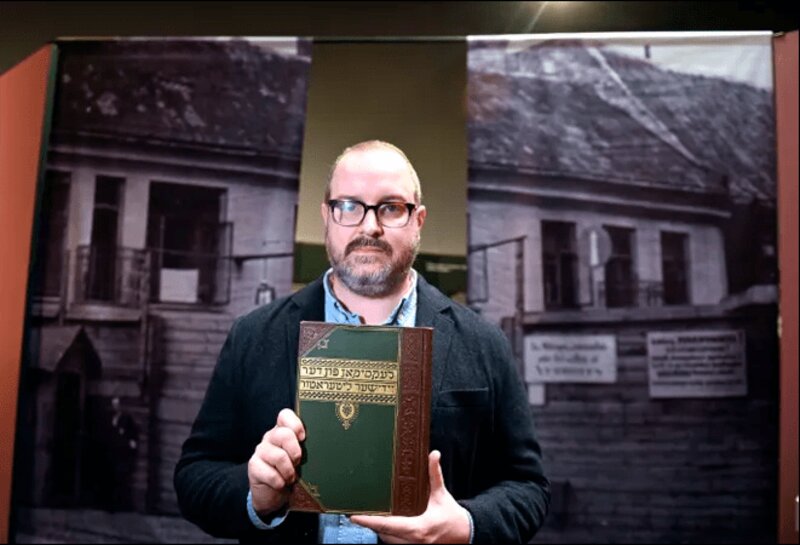
January 20, 2022
‘Book Smugglers’ exhibit at Holocaust Center explores Lithuania town’s quest to save its culture
'Book Smugglers' exhibit at Holocaust Center explores Lithuania town's quest to save its culture

The Book Smugglers
A new exhibit at the Holocaust Memorial Center is about Jews in Lithuania who smuggled books and other important artifacts during the holocaust. Photo Credit: Todd McInturf, The Detroit News
Farmington Hills — A sign hangs from the ceiling at the start of a new exhibit at the Zekelman Holocaust Center, asking the ultimate question: “Would you risk your life to save a book?”
That was the choice that faced Jews in the community of Vilna, Lithunania, during World War II. Living in a ghetto under Nazi occupation with not just their lives but culture under attack, a small group of writers and activists decided to smuggle or hide as many cultural artifacts as they could to save them from being destroyed or repurposed — books, plays, journals, artwork, religious artifacts and more.
That campaign to save cultural artifacts from not just the Nazis but a subsequent Communist occupation of Vilna is part of a new exhibition, “The Book Smugglers: Partisans, Poets, and the Race to Save Jewish Treasures from the Nazis.” Based on a book by David Fishman and originally curated by Holocaust Museum Houston, the exhibit runs through May 31.

Mikhail Kovner, member of the Paper Brigade, sorts documents at the YIVO Institute for Jewish Research. Thousands of books, art and religious artifacts were smuggled out of Vilna, Lithuania during World War II. Photo Credit: Moreshel Archive/Anielevich Memorial Holocaust Study and Research Center
“We have so many stories that we need to tell and this is a very compelling story about saving culture and the risks that people took,” said Ruth Bergman, the Memorial Center’s director of education.
The “Book Smugglers” features roughly 100 replicas of images, books, art and more. In the early 1940s, a “paper brigade” of roughly 40 writers, educators and activists in Vilna saved thousands of items, sometimes hiding items in their clothes, bunkers and other locations so they wouldn’t be destroyed.
“The Paper Brigade’s job was to loot the cultural materials of Jewish Vilna. And they decided while doing that work that this material was too important to send back to Germany,” said Mark Mulder, the Holocaust Center’s manager of curatorial affairs.
The exhibit opens just days before International Holocaust Remembrance Day, which is Jan. 27. Nearly 6 million Jews died during the Holocaust.
“It helps us remember the victims, and remember their stories and the stories they can’t tell — as well, of course, of the survivors. And it counters Holocaust denial,” said Bergman.
Exhibit curator Mark Mulder, of Grosse Pointe, in front of the entrance to the Vilna ghetto entrance to the exhibit as he holds the original 1929 book of Yiddish lexicon from Vilna, Tuesday afternoon, Jan. 18, 2022. Photo Credit: Todd McInturf, The Detroit News
Vilna, Lithuania was a haven of Jewish culture before World War II. Known at one time as the “Jerusalem of Lithuania,” that was because of the literature being created there, scholarship and it was a real center “for the Yiddish language and culture in that part of the world,” said Mulder. “It really was an incredible place for theater and art and religion and culture.”
The exhibit, which is divided into three parts, “really explores resistance throughout those two occupations (the Nazis and the Communists) and how people risked their lives to salvage cultural materials like books, manuscripts, letters and other artifacts,” said Mulder.
They hid artifacts in multiple spots, one being a library that was established in the ghetto.
“Pretty much anywhere that they could stash (items), they would do it,” Mulder said.
But even after the Nazi occupation of Vilna ended in 1944, Vilna was dealt another blow when communist Russia took over. Artifacts again had to be saved. Eventually, many artifacts made their way to western Europe and later the YIVO Institute for Jewish Research in New York.

Holocaust Memorial Center Director Ruth Bergman, of Farmington Hills, poses at the new exhibit about Jews in Lithuania who smuggled books and other important Jewish artifacts during the holocaust so they wouldn’t be destroyed, as seen on Tuesday afternoon, Jan. 18, 2022. Bergman also talks about International Holocaust Remembrance Day, which is Thursday, Jan. 27th. Photo Credit: Todd McInturf, The Detroit News
Some of the Paper Brigade members such as poet Shmerke Kaczerginski weren’t religious but realized how important it was to save these Jewish artifacts.
“They saw it as more than ‘These need to be saved,'” said Mulder. “It was, ‘This is our culture in physical form.'”
‘The Book Smugglers: Partisans, Poets and the Race to Save Jewish Treasures from the Nazis’
Through May 31 at the Zekelman Holocaust Center
Go to www.holocaustcenter.org/.
Share This Story, Choose Your Platform!
Marx Layne is your competitive advantage.
Your reputation and success are our only concerns.
